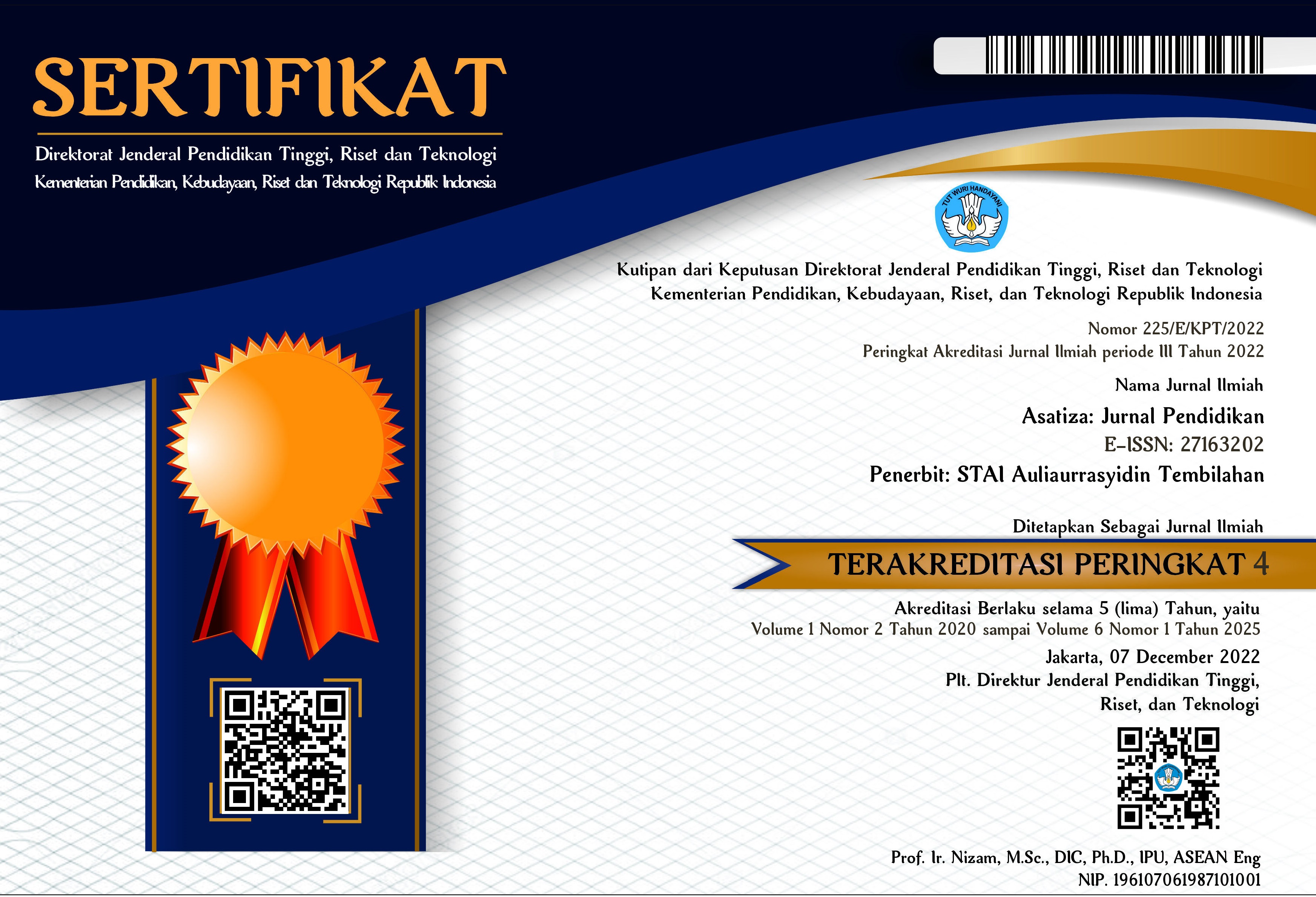The Effect of wordwall.net on Students’ Vocabulary Mastery in Reading Narrative Text at SMK Muhammadiyah 2 Pekanbaru
DOI:
https://doi.org/10.46963/asatiza.v5i2.1800Keywords:
Wordwall.net, Vocabulary, Narrative TextAbstract
This study examined the effect of Wordwall.net has any effect on students’ vocabulary mastery in reading the narrative texts of the tenth-grade students of SMK Muhammadiyah 2 Pekanbaru in 2023/2024. This research used a true experimental design with quantitative approach by randomly selecting the sample. Class 10 Pengembangan Perangkat Lunak dan Gim (PPLG) 1 selected as the experimental class (taught using Wordwall.net) and class 10 Pemasaran as the control class (taught using the conventional method). Data collected using pre-tests and post-tests, then analyzed using SPSS 24. The results revealed that the average pre-test and post-test score in the experimental class was increased by 8.93%, while in the control class, it only increased by 3.49%. The result of the independent sample T-test was 0.048, which is smaller than the alpha value (0.05). Based on the study’s results, it can be concluded that using Wordwall.net influenced students’ vocabulary mastery in reading narrative texts.
Downloads
References
Alpatikah, E. (2022). The Effect of using wordwall. net on student’s vocabulary mastery (bachelor’s thesis, Jakarta: FITK UIN Syarif Hidayatullah Jakarta). https://repository.uinjkt.ac.id/dspace/bitstream/123456789/62299/1/11170140000048_ERLIN%20ALPATIKAH.pdf
Çil, E. (2021). The effect of using Wordwall. net in increasing vocabulary knowledge of 5th Grade EFL students. Language Education and Technology, 1(1), 21-28.http://langedutech.com/
Dakhi, S., & Fitria, T. N. (2019). The principles and the teaching of English vocabulary. A review. Journal of English teaching, 5(1). https://doi.org/10.33541/jet.v5i1.956
Gaona Vicente, L. F. (2022). Word wall and vocabulary learning (bachelor’s thesis, Universidad Técnica de Ambato-Facultad de Ciencias Humanas y de la Educación-Pedagogía de los Idiomas Nacionales y Extranjeros). https://repositorio.uta.edu.ec/jspui/handle/123456789/35980
Irawati, D., Najili, H., Supiana, S., & Zaqiah, Q. Y. (2022). Merdeka belajar curriculum innovation and its application in education units. Edumaspul: Jurnal Pendidikan, 6(2), 2506-2514. https://doi.org/10.33487/edumaspul.v6i2.4603
Ismail, I. (2019). The impact of interactive reading using local folktales stories in supporting students’ vocabulary achievement in Indonesian EFL Learners. Majesty Journal, 1(2), 25-37. https://doi.org/10.33487/majesty.v1i2.119
Mutmainah, M. (2022). Students’ perceptions and engagement in learning english with the use of gamification through wordwall educational website (Doctoral dissertation, Universitas Pendidikan Indonesia). https://repository.upi.edu/81469/
Nurkhotimah, S. (2022). Fostering students’ reading comprehension of narrative text throug 3-2-1 strategy (A classroom action research at the students of tenth grade of manahijussadat islamic boarding school in academic year 2021/2022). (Bachelor's thesis, Jakarta: FITK UIN Syarif Hidayatullah Jakarta). https://repository.uinjkt.ac.id/dspace/handle/123456789/62786
Purwitasari. (2022). The effectiveness of wordwall application in improving students' vocabulary mastery (Doctoral dissertation, IAIN Ponorogo). http://etheses.iainponorogo.ac.id/id/eprint/19900
Sari, P. M., & Yarza, H. N. (2021). Pelatihan penggunaan aplikasi quizizz dan wordwall pada pembelajaran IPA bagi guru-guru SDIT Al-Kahfi. SELAPARANG: Jurnal Pengabdian Masyarakat Berkemajuan, 4(2), 195-199.
https://doi.org/10.31764/jpmb.v4i2.4112
Sentani, A. D., Yudianto, A., & Rahmat, D. (2022). Implementasi game Wordwall untuk meningkatkan hasil belajar bahasa Inggris di kelas X SMK Muhammadiyah 1 Kota Sukabumi. Jurnal Pendidikan Teknologi Informasi dan Vokasional, 4(1), 1-8. http://dx.doi.org/10.23960/jpvti.v4.i1.202201
Shanahan, T. (2005). The National Reading Panel Report: Practical Advice for Teachers. Learning Point Associates/North Central Regional Educational Laboratory (NCREL). https://eric.ed.gov/?id=ED489535
Sugiyono. (2022). Metode Penelitian Kuantitatif. Bandung: Alfabeta.
Widodo, U., Sudarto, S., Walyono, W., Suyatno, T., & Dewi, M. P. (2022). Improving students’ vocabulary mastery: Strategy, obstacles, and problems. Edukatif: Jurnal Ilmu Pendidikan, 4(5), 6814-6822. https://doi.org/10.31004/edukatif.v4i5.3867
Yulfischa, E. (2023). The correlation between students’ vocabulary mastery and their reading comprehension in recount text at MTs Yayasan Misi Islamiyah PT. Inecda Indragiri Hulu (Doctoral dissertation, Universitas Islam Negeri Sultan Syarif Kasim Riau). http://repository.uinsuska.ac.id/id/eprint/68606
Downloads
Published
Issue
Section
License
Copyright (c) 2024 Nadya Wahyuni Safitri, Rumiri Aruan, Atni Prawati

This work is licensed under a Creative Commons Attribution-ShareAlike 4.0 International License.
Authors who publish with this journal agree to the following terms:
1. Copyright on any article is retained by the author(s).
2. The author grants the journal, right of first publication with the work simultaneously licensed under a Creative Commons Attribution shareAlike 4.0 International License that allows others to share the work with an acknowledgment of the work’s authorship and initial publication in this journal.
3. Authors are able to enter into separate, additional contractual arrangements for the non-exclusive distribution of the journal’s published version of the work (e.g., post it to an institutional repository or publish it in a book), with an acknowledgment of its initial publication in this journal.
4. Authors are permitted and encouraged to post their work online (e.g., in institutional repositories or on their website) prior to and during the submission process, as it can lead to productive exchanges, as well as earlier and greater citation of published work.
5. The article and any associated published material is distributed under the Creative Commons Attribution-ShareAlike 4.0 International License











2.png)



